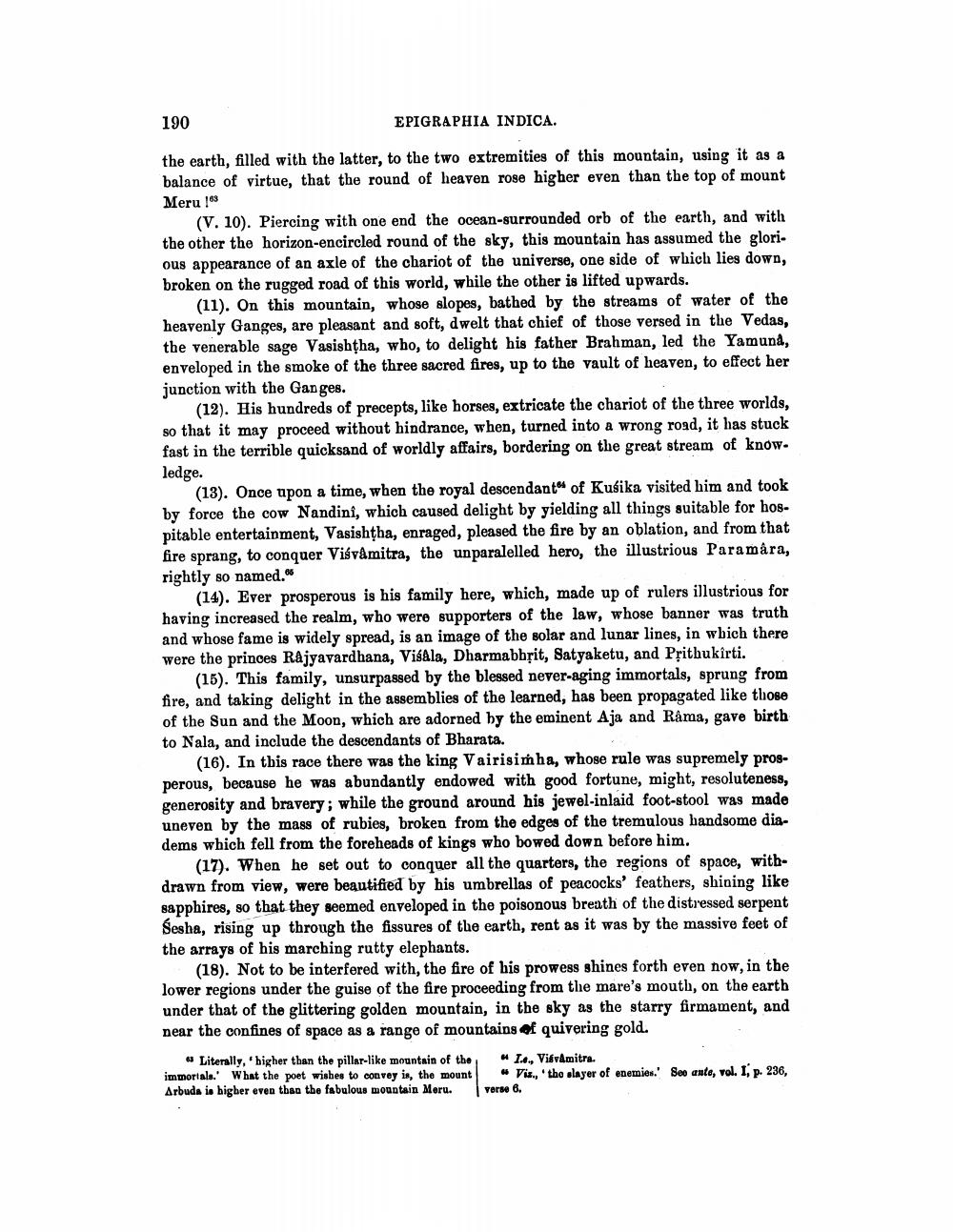________________
190
EPIGRAPHIA INDICA.
the earth, filled with the latter, to the two extremities of this mountain, using it as a balance of virtue, that the round of heaven rose higher even than the top of mount Meru 18
(V. 10). Piercing with one end the ocean-surrounded orb of the earth, and with the other the horizon-encircled round of the sky, this mountain has assumed the glorious appearance of an axle of the chariot of the universe, one side of which lies down, broken on the rugged road of this world, while the other is lifted upwards.
(11). On this mountain, whose slopes, bathed by the streams of water of the heavenly Ganges, are pleasant and soft, dwelt that chief of those versed in the Vedas, the venerable sage Vasishtha, who, to delight his father Brahman, led the Yamuna, enveloped in the smoke of the three sacred fires, up to the vault of heaven, to effect her junction with the Ganges.
(12). His hundreds of precepts, like horses, extricate the chariot of the three worlds, so that it may proceed without hindrance, when, turned into a wrong road, it has stuck fast in the terrible quicksand of worldly affairs, bordering on the great stream of know. ledge.
(13). Once upon a time, when the royal descendants of Kusika visited him and took by force the cow Nandinî, which caused delight by yielding all things suitable for hospitable entertainment, Vasishtha, enraged, pleased the fire by an oblation, and from that fire sprang, to conquer Visvamitra, the unparalelled hero, the illustrious Paramara, rightly so named.
(14). Ever prosperous is his family here, which, made up of rulers illustrious for having increased the realm, who were supporters of the law, whose banner was truth and whose fame is widely spread, is an image of the solar and lunar lines, in wbich there were the princes Rajyavardhana, Visala, Dharmabbřit, Satyaketu, and Prithukîrti.
(15). This family, unsurpassed by the blessed never-aging immortals, sprung from fire, and taking delight in the assemblies of the learned, has been propagated like those of the Sun and the Moon, which are adorned by the eminent Aja and Råma, gave birth to Nala, and include the descendants of Bharata.
(16). In this race there was the king Vairisimha, whose rule was supremely progperous, because he was abundantly endowed with good fortune, might, resoluteness, generosity and bravery, while the ground around his jewel-inlaid foot-stool was made uneven by the mass of rubies, broken from the edges of the tremulous handsome diadems which fell from the foreheads of kings who bowed down before him.
(17). When he set out to conquer all the quarters, the regions of space, withdrawn from view, were beautified by his umbrellas of peacocks' feathers, shining like sapphires, so that they seemed enveloped in the poisonous breath of the distressed serpent Sesha, rising up through the fissures of the earth, rent as it was by the massive feet of the arrays of his marching rutty elephants.
(18). Not to be interfered with, the fire of his prowess shines forth even now, in the lower regions under the guise of the fire proceeding from the mare's mouth, on the earth under that of the glittering golden mountain, in the sky as the starry firmament, and near the confines of space as a range of mountains of quivering gold.
« Literally, higher than the pillar-like mountain of the "Lo, Vigvamitra. immortals. What the poet wishes to convey is, the mount - Vis.. tho slayer of enemies.' Seo ante, vol. I, p. 236, Arbuda is bigber even than the fabulous mountain Meru. verse 6.




